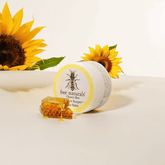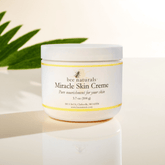The Relevance of Sunscreen All Year Round
There is a general preconceived notion that sunscreen should only be applied when the sun is up, and quite understandably so. The name itself describes a product that shields our skin from the sun. However, despite the name, sunscreens are formulated to protect from UV radiation rather than the sum itself. This then begs the question, are these UV radiations exclusive to the summer months?
While ultraviolet radiations vary significantly with seasons and tend to be higher in the summer, studies have shown the presence of UV rays across other seasons. And if these studies are anything to go by, then we need to limit our exposure to these rays all year round. That said, most people remain misinformed regarding the use of sun blocks when to apply them, and the best products to get. Let's address them one after the other.
Sunscreen and UV rays
The link between sun exposure and skin cancer is well established, resulting in a significant adoption of sunscreen globally. Yet, there still seem to be uncomfortably high incidences of skin cancer annually. According to the American Academy of Dermatology, one in five people are likely to be diagnosed with the disease over the course of their lifetime.
Because 90 percent of all skin cancers are, to some extent, a result of UV radiation from the sun, there is a need to reassess how we protect ourselves from the sun. The first course of action; applying sunscreen all year round.
Understanding UV Radiations
Typically, sunlight produces two types of harmful UV rays: UVA and UVB. UVA rays are directly linked to the cosmetic effects of sun exposure, from wrinkles to skin discolorations. On the other hand, UVB rays are carcinogenic and tend to be more intense in the summer. When we apply sunscreen during the summer, we effectively protect ourselves from UVB rays; however, UVA rays travel in a different pattern, making them present in all seasons.
These UVA rays penetrate deeper than UVB rays and can pass through clouds, making exposure possible even without a visible sun. They also have the ability to reflect off surfaces, such as glass and snow. While exposure may seem non-existent on cloudy, overcast, or winter periods, these invisible rays cause consistent damage, which is evident in the projected annual skin cancer cases.
To combat this, sunscreens contain active components that shield the skin from both rays. However, we must acknowledge that while these products market themselves as summer essentials, there’s a need to change this narrative and protect ourselves all year round.
What Sunscreen Should I Use?
While sunscreen might seem like a recent idea, sun protection has been a prevalent practice for a long time. Mud, rice bran, olive oil, and zinc oxide were used in ancient times to protect from the sun’s intensity. These practices were highly effective, so much so that the best sunscreen products today contain some of these ingredients.
If you find yourself seeking a high-quality sunscreen, it is advisable to opt for a product that encompasses the following essential ingredients.
Zinc Oxide
Zinc oxide is considered the most effective broad-spectrum UV filter, capable of providing comprehensive protection from UVA and UVB rays. The importance of zinc oxide extends beyond sun protection. It has also proven effective in healing injuries or skin damage like tenderness or severe sunburn.
This active ingredient also helps to control oil formation and prevent excessive oil production, making it the perfect choice for oily skin. The anti-inflammatory and antimicrobial properties of zinc oxide make it beneficial in addressing inflammatory skin conditions like acne and limiting the risks of bacterial infection.
Recent studies have also proven zinc oxide to be a more efficient alternative to petroleum jelly for skin slugging. In addition to helping to repair the skin while locking in hydration, its calming effect makes it a more viable option.
Titanium Dioxide
Alongside the benefits of zinc oxide, there’s also the need to address the far-reaching capabilities of UVB rays directly. This is where titanium dioxide becomes significantly beneficial. Titanium dioxide is a well-known, FDA-approved natural mineral ingredient used in sunscreen products, particularly for its adequate UVB protection.
Titanium dioxide’s non-comedogenic nature makes it less likely to block skin pores or trigger breakouts, ideal for sensitive skin. Furthermore, it’s inert and does not react with other ingredients.
Tint
If you’re in the beauty industry, you must have noticed the increasing popularity of tinted sunscreens each year. Tinted sunscreen products are mineral-based, broad-spectrum products formulated to match any skin color.
They contain a mix of pigments, ensuring they do not leave a whitening cast on the skin. Ultimately, tinted sunscreens with zinc oxide and titanium dioxide minerals are the best options, giving you a natural look while also providing effective sun protection.
Today, several sunscreen products present a vast spectrum of active sun protection ingredients. However, your sunscreen should only contain ingredients that have been approved and proven effective for all-around protection.
Introducing Bee Naturals Tinted Sunscreen, SPF 40
At Bee Naturals, we aim to harness the full benefits of natural ingredients in formulating skin care products that help to rejuvenate and nourish the skin. As such, we are introducing you to our new sun protection product: Bee Naturals SPF 40 Sunscreen.
This product is specially formulated with the natural active ingredients highlighted above to provide you with comprehensive protection from all types of ultraviolet radiation. It’s also tinted, making it exceptionally elegant and versatile for use on all skin tones and types, including acne-prone, rosacea-prone, dry, and oily skin.
Bee Naturals Tinted Sunscreen is rated SPF 40, protecting you from 97.5 percent of UVB radiation. It’s also free of all chemical sunscreen fragrances, dyes, gluten, parabens, and phthalates. Our mineral sunscreen ingredients also lay on top of the skin, so you can be sure nothing is absorbed into your skin and bloodstream.
Furthermore, based on the new FDA sunscreen regulations, our mineral ingredients are G.R.A.S.E (Generally Recognized As Safe and Effective) and reef-friendly. As you have come to expect from Bee Naturals, this product emphasizes our dedication to natural skincare products, and our sunscreen will protect you all year round.
Effects of Not Using Sunscreen








Leave a comment
Please note, comments need to be approved before they are published.